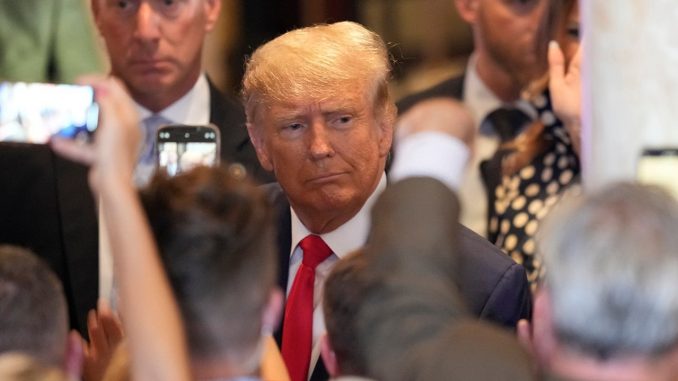
Donald Trump paid no income tax during his last year as president, according to his tax returns, which were released to a congressional committee and are set to be made public within a few days.
Despite pulling in nearly $11 million in interest from investments in addition to his nearly $400,000 salary, Trump did not pay income taxes because he also reported a $16 million loss from his real estate businesses. That loss put the former president almost $5 million in the red for 2020.
That means he didn’t have any taxable income and he didn’t pay anything in income tax.
This pattern of high investment returns offset by high business losses continues throughout the tax returns that the House Ways and Means Committee obtained and released as part of larger reports on the IRS’s presidential audit system this week.
In 2019, Trump reported about $20 million in income from investments, offset by $16 million in real estate losses.
His investment gains were offset by $11 million in business losses in 2018, by $16 million in losses in 2017 and by more than $76 million in losses in 2015.
All these losses originate in one large loss of more than $105 million reported by the Joint Committee on Taxation in 2015, which was itself part of a $700 million loss going back to 2009.
By spacing out this mega-loss, tax experts say that Trump was able to reduce his tax liability year by year, making sure he never got an outsize bill from the IRS.
“Trump paid nothing in taxes for years and years. How does he do that? Through losses. By using losses as a sheltering device,” Steve Rosenthal, a tax analyst with the Urban-Brookings Tax Policy Center who has testified to Congress about Trump’s taxes, said in an interview.
Other tax experts said it was incorrect to describe Trump as having used tax shelters, arguing that he had suffered real losses.
“His old losses are not ‘tax shelters.’ They were losses that he incurred that are being rolled over year to year. If he never incurred the losses, he would not be able to take them,” Steve Goldburd, a tax attorney and partner at the Goldburd McCone law firm in New York, said in an interview.
Goldburd pointed out that while Trump didn’t pay income tax in 2020, the former president has been making payments of his estimated taxes while rolling over portions of his refunds from previous years.
“He is continually paying in estimated taxes,” Goldburd said. “Three million [dollars] in 2020 plus a $10.6 million rollover for 2019. In 2019, it was $700,000 plus a $9.8 million rollover from the previous year.”
Goldburd said that losses in the real estate world faced by building owners such as Trump might not even be due to the fact that the buildings are losing money but rather due to maintenance costs that can be written off as depreciation.
“As a real estate professional, [Trump] is entitled to take these losses,” he said. “These losses can be from actual losses, but more likely from real estate depreciation expenses. These entities may not actually be losing money, but in fact have the depreciation that’s wiping out the partnership’s income.”
Trump is not being accused of breaking laws by using his business losses to protect his income from tax liability.
But Trump’s approach to paying taxes, which he has likened to playing a sport, along with the accounting practices that exempt him from the tax burdens faced by most Americans, are raising broader questions about the tax code.
“These are issues much bigger than Donald Trump. Trump’s returns likely look similar to those of many other wealthy tax cheats—hundreds of partnership interests, highly-questionable deductions, and debts that can be shifted around to wipe out tax liabilities,” Senate Finance Committee Chairman Ron Wyden (D-Ore.) said in a statement Wednesday.
“We need legislation to simplify the tax code, particularly in the area of partnerships,” he said. “Putting an end to the games wealthy tax cheats play with their partnerships is going to be a priority going forward.”
Wyden has legislation that he says will close loopholes related to partnerships to help simplify the tax code, but insiders warn about the institutional forces in Washington that could mobilize to block initiatives like this one.
“Every loophole has a constituency,” said Rosenthal. “So often, there’s nobody standing for the public’s interest. There’s just a whole bunch of constituent interests, and those can be bought off pretty easily.”
Speaking at an event in November, Fred Goldberg, who was Commissioner of the IRS under George H.W. Bush, said that simplifying the tax code should be an overarching goal for lawmakers.
“That’s been the holy grail for 40 years,” he said.
Via The Hill
